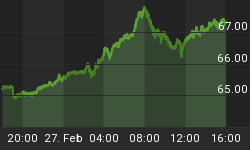Will Rogers famously quipped, "It is difficult to make predictions, especially about the future". Ignoring Mr. Rogers' sage advice I will attempt to make some educated guesses about the future anyway, albeit with the assistance of some analysts far more prescient than I.
The evidence from Kenneth Rogoff's recent research is that in the three years following a financial crisis, on average, cumulative fiscal deficits almost double. We seem to be well along this path in the current crisis.
Rogoff's research also shows that how these deficits are financed is critical to the question of whether inflation ensues, whether you have a Japanese or an Argentinean style post-crisis experience. If the deficits are funded from existing private sector savings ("belt-tightening" as Rogoff describes it) they are typically not inflationary - e.g. Japan. If they are monetized by the central bank (the money is created) they are inflationary - e.g. Argentina.
Today, in one corner, we have the wholesale liquidation of mal-investments that have accumulated in virtually every segment of the western economies from residential and commercial real estate down to the municipal bond markets. In the other corner, we have governments that are actively resisting this cleansing process as it threatens the solvency of the politically influential financial sector.
The result is that via bailouts and unprecedented fiscal deficits private sector credit problems are being moved onto public sector balance sheets - balance sheets that are already in precarious condition from past over-spending and unfunded future liabilities. By nationalizing private sector losses governments around the globe are seriously compounding their existing budget problems.
According to research by Société Générale, EU and US net liabilities add up to around $135 trillion. That's roughly four times the capitalization of the world's equity markets and forty times the cost of the 2008 financial crisis. The US plans to accumulate an additional $10 trillion in deficits over the next decade.
These enormous numbers beg the question of how our governments plan to fill their funding gaps? Of course they will attempt to raise taxes, but it seems clear that they are going to resort to inflation as well. Inflation is more politically expedient as the alleged benefits are immediate while the all too real costs are delayed.
To borrow yet again from Jens Parsson and his excellent book "Dying of Money":
"The government is free to incur any deficit and issue any amount of debt it may wish, so long as it is willing to draw purchasing power away from other borrowers and to tolerate the rise in interest rates which will result. The debt will create no inflation.
Government deficits and government debt thus are not inflationary if they stand alone, but they never stand alone. The creation of government debt is practically always accompanied by an increase of money. Competing against private borrowers for a static supply of credit capital, a large government debt issue would drive interest rates upward, and high interest rates are anathema to a government.
A large government debt issue simply could not be marketed without a large increase in the money supply. Therefore the government creates not only the debt but also the money with which to buy it. In addition, large government deficit expenditure tends to accelerate the velocity of money because the government spends its money more rapidly than cautious private spenders do. This combination of increased quantity and velocity of money, not the deficits, does the job, both for economic stimulation and for monetary inflation."
Now here is an attempt at one of those tricky guesses about the future - will we see inflation or deflation over the next decade? I believe you can answer this question by considering the effect of the following factors:
- Government Spending & Deficits - increasing
- Regulation - increasing
- Taxes - increasing
- Money Supply - increasing
Based on these factors I believe that rather than outright inflation or deflation we face stagflation in the developed world as further state expansion into the economy will reduce real growth while accelerating fiscal deficits combined with money supply expansions will lead to inflation.
Low growth + high inflation = stagflation
Therefore, our investment thesis continues to be to gain long-term exposure to inflation hedging, income generating assets, with demonstrated linkages to emerging market growth - energy and agriculture remain our preferred sectors.















